Some of Handel’s oratorios aspire to theatre; some have had theatre thrust upon them. Solomon has neither sustained drama nor a coherent narrative, but it does have some fantastic music and a tenor of celebration and glorification.
Sir John Eliot Gardiner has described Solomon as ‘the most magnificent, certainly the most lavish of all Handel’s oratorios’, and it’s true that the pageant-like structure, and the full and varied orchestration, especially in the magnificent double choruses, creates a triumphant air. Indeed, the oratorio is really a series of tableaux honouring love, nature, justice and art. The author of the libretto – which draws on the biblical books of Kings and Chronicles, the Song of Solomon, and also Flavius Josephus’s The Early History of the Jews – is unknown, though the discovery of an impertinent poem about Moses Mendes (c1690-1758), a London-based Jewish financier-poet, in the leather-bound of his friend, the London Scrivener John Ellis (1698-1791), has led to arguments that Mendes may be the anonymous author of both Solomon and Handel’s next oratorio, Susanna.
The first Act celebrates the consecration of Solomon’s temple and the wedding of Solomon and an Egyptian princess; the second demonstrates Solomon’s wisdom in adjudicating a dispute between two women both of whom claim a child as their own; the third presents a state visit by the Queen of Sheba – a encomium to the imagined Solomonic nature of British rule in the mid-18th century, and a golden age of peace and prosperity, one supposes. It’s also often suggested that Handel composed the work in homage to his royal patron, George II. And, though the latter is an unlikely model of wise, democratic government, perhaps the eighteenth-century English elite did like to see their land and its culture idealised as a utopia of humanism and tolerance? But, the oratorio wasn’t a success in Handel’s lifetime. After the premiere on 17th March 1749, there were only two further performances, on 20th an 22nd March, and there were no performances of the work outside London, though Handel presented some parts in his charity concerts for the chapel of the Foundling Hospital and borrowed some of the score for use elsewhere.
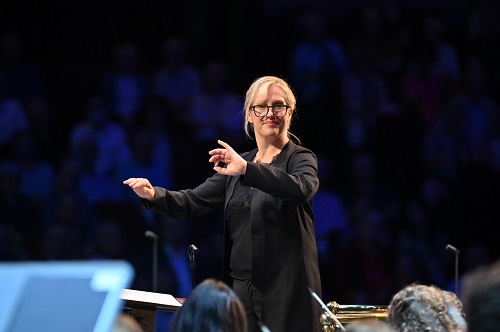
However, even if Solomon doesn’t ‘tell a straight story’, it’s more that ‘just’ gorgeous music and it needs to be presented with dynamic impetus and a persuasive ‘shape’. This performance by the English Concert and the BBC Singers, conducted by Sofi Jeannin, was a bit light on both qualities despite the presence of a dream team of soloists who all performed superbly. Whatever the unconventional nature of this oratorio, it’s hard not to feel that some of the absence of persuasive momentum and form was the responsibility of Jeannin, who didn’t seem alert to either the ceremonial splendour or the pastoral sensuousness of the oratorio. Her tempi were generally swift but often inflexible, and she didn’t seem to seek out those instrumental and choral details that could have made all the difference.
Perhaps the problem was ‘numbers’ – especially given the size of the Hall, something I’ve wondered about during several past Proms performances of Baroque operas and oratorios by small-ish period-instrument forces. One couldn’t fault the accuracy and vitality of the BBC Singers – rhythms were snappy, phrases were lithe or lyrical as required. ‘May no rash intruder disturb their soft hours’ which ends Act 1 was beautifully soft and warm, the ensemble harmony enhanced by the dulcet ‘nightingale’ flutes. At the other end of the expressive spectrum, the massive opening chorus of Act 2 ‘From the censer curling rise’, was taut and vitalised, the surging crescendos enriched by vibrant trumpets, horns and energised timpani playing from Pedro Segundo – though the cry of praise, “Happy, happy Solomon!” was rather polite. But, at 24-strong the BBC Singers couldn’t conjure the weight and grandeur needed in an auditorium of this size, and it didn’t help that the two choirs were not spatially separated, which would have added aural and visual drama.
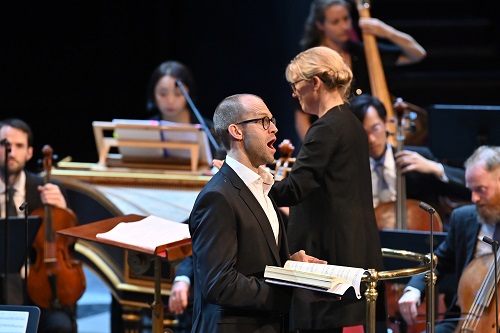
The instrumental textures seemed rather string-heavy – and, I couldn’t tell exactly what decisions Jeannin had made about the ‘ripieno’ instructions in the score, which Handel intended to indicate additional players who were not part of the make-up of his usual ensemble. Even in the Maestoso overture to Act 1, one would have liked a stronger flavour of the oboes’ nasal tint, and generally the tone colours were not as varied as Handel’s use of various wind instruments suggests they should be. The continuo of cello (Jonathan Byers), harpsichord (Masumi Yamamoto) and organ (Stephen Farr) was stylish but simply couldn’t generate enough sweep to propel the recitatives.
Overall, the performance felt too decorous, and there were longueurs between the numbers as singers rose from their chairs at the side to walk to the centre. There was little eye contact between the soloists, even in the most intense scenes, and words were often in short supply (at least from my perch on the right side of the stalls – though there were exceptions among the soloists). Act 1 is surprisingly sensual – indeed, the indecorousness of the Act may have been one reason for the contemporary audience’s distaste, for when he revised the score in preparation for a planned performance, shortly before his death, Handel excised nearly all of the opening Act. Solomon invites his Queen to hasten into his cedar grove – “come come away/ My love admits of no delay” – and the intimacy of the scene should make one feel the passion, but while the singers blended rapturously in their sensuous duet and the violins, led by Nadja Zwiener, worked hard to make their interjections tell, the whole felt lacking in the sorts of nuance that might convey the erotic urgency of the scene.
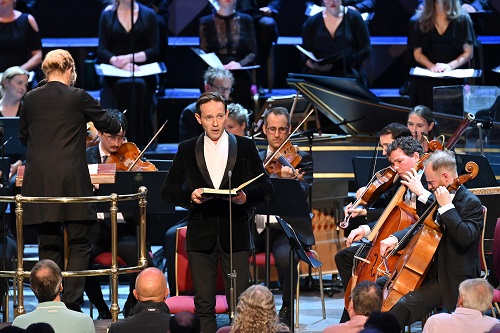
Though vocal standards were very high, the soloists at times seemed reluctant to seize the potential of the dramatic moments. Handel’s first Solomon was the leading mezzo-soprano of his day, Caterina Galli. Here, the wise ruler was Iestyn Davies, but his countertenor has more than enough bloom and richness to equal the ripest mezzo, and his easeful projection and coloristic nuance was especially noticeable in the recitatives which had a flowing naturalness. He was perhaps more persuasive in the arias of absorbed introspectiveness and spiritual wisdom, than in the more amorous numbers, though. ‘What though I trace each herb and flow’r?’ had a lovely inwardness and calm, and Davies’ attention to detail, aided by a superlative technique, was apparent in the ornaments which graced the broadening then flowering phrase, “Did I not own Jehovah’s pow’r/ How vain were all I knew”, and in the beautiful decorations of the da capo which paradoxically evoked the pedantry, vanity and boastfulness that Solomon here rejects. The easeful ringing roundness of Davies’ tone never ceases to impress and amaze.
Elsewhere though, while meticulous, the countertenor sometimes seemed a little detached. The aforementioned ‘Haste, haste to cedar grove’ didn’t make one smell the fragrant spices or laugh at the amorous turtles’ antics, and in the trial scene of Act 2, though suggesting that to the disputing mothers that a babe should be hacked in half, this Solomon seemed rather distant, not making eye contact with the warring women as he instructed, “Divide the babe, thus each her part shall bear./ Quick bring the faulchion, and the infant smite”. The Act 3 Cecilian sequence on the power of music displayed all of Davies’ musical intelligence and artistry, however, his dulcet lyricism inspiring singing of great beauty from the chorus in their shared numbers.
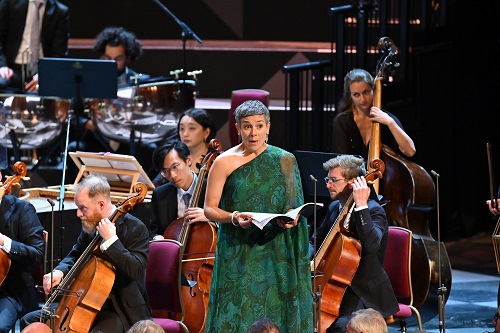
Anna Dennis sang with lovely purity as Solomon’s queen. The extended, graceful lines of ‘With thee th’unshelter’d moor I’d tread’ were beguilingly clear and fresh, and the queen’s recollection of nuptial bliss, ‘Bless’d the day when first my eyes’, was expressively focused, though more elasticity and less heavy accents in the accompaniment might have deepened the ecstasy. As the First Harlot, Dennis conveyed the anguish and urgency of the baby’s true mother, her pleading, ‘Can I see my infant gor’d’, persuasively heartfelt. Wallis Giunta’s rich colours made for a nice contrast and she used them well to convey the Second Harlot’s falseness. Later she captured The Queen of Sheba’s glamour, and worked hard to make something of the dramatic scenario of Act 3. It was a pity that her aria ‘Every sight these eyes behold’ was cut, as was Solomon’s ‘How green our fertile pastures look’, which meant that ‘Will the sun forget to streak’ was lacking the ‘wise instructions’ which prompt the Queen to vow that the latter will be her ‘future care,/ Soft as the show’rs that cheer the vernal air,/ Whose warmth bids ev’ry plant her sweets disclose;/ The lily wakes, and paints the op’ning rose.’ It would have been pleasing to have more prominent oboe colouring here, and perhaps the positioning of the woodwind at the very rear of the string ensemble was not helpful, but Giunta sang with expressive feeling.
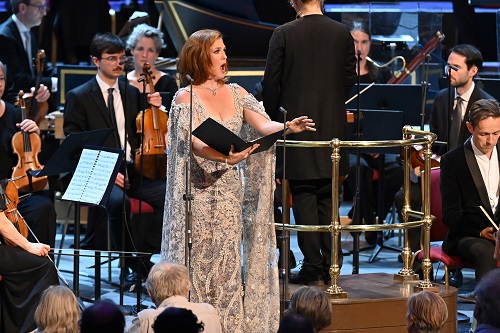
As the Levite, Ashley Riches was firm of voice and his characterisation was strong, his diction excellent. The text of his first aria, ‘Praise ye the Lord’, may be fairly mundane but he sought out the nuances and genuine sentiment, and he was totally secure in ‘Thrice bless’d in Act 2, issuing his words of wisdom with authority. Riches lost one of his arias; Benjamin Hulett, an expressive Zadok, lost two. But, Hulett’s lovely tone and excellent coloratura impressed in ‘Sacred raptures cheer my breast’, and in Act 3’s ‘Golden columns, fair and bright’, he conveyed a nice sense of pomp, without bombast and aided by some swish fiddle flourishes. Tenor Peter Davoren emerged from the chorus to give an accomplished account of Attendant’s recitative, informing Solomon of the dispute between two women.
Jeannin moved the mammoth chorus, ‘Praise the Lord with heart and tongue’, from its place following ‘Golden columns’ – which is in the same key – to the very end of the final Act, excising Handel’s closing chorus, ‘The name of the wicked shall quickly be past’. She’s not the first to do so – John Eliot Gardiner is one who likes the more flashy ending ‘Praise the Lord’ affords – but despite the closing opulence it didn’t quite overcome the feeling that had Jeannin shown more feeling for Solomon’s grand gestures throughout, and the dramatic potential of the oratorio’s scenes, this would have been a more compelling performance overall.
Claire Seymour
Handel: Solomon
Solomon – Iestyn Davies, Solomon’s Queen/First Harlot – Anna Dennis, Zadok – Benjamin Hulett, A Levite – Ashley Riches, Queen of Sheba/Second Harlot – Wallis Giunta, BBC Singers, The English Concert, Sofi Jeannin (conductor)
Royal Albert Hall, London; Friday 19th August 2022.